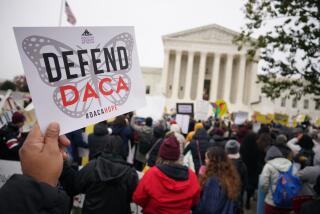Bills Seek to Raise Hurdle for Immigrants
- Share via
WASHINGTON — The Statue of Liberty still extends a welcome to the world’s “poor . . . huddled masses yearning to breathe free,” but lawmakers in both houses of Congress are attempting to enact strict financial hurdles for foreign nationals who apply to enter the country legally.
Under the House legislation approved last week, legal immigrants in most cases would be considered for entry only if their U.S. sponsors earn at least 200% of the federal poverty level, or roughly $31,140 a year for a family of four.
The Senate bill, headed toward the floor next month, contains a similar provision but at 125% of the poverty level.
The aim is not to attract solely the well-off but to keep legal immigrants off the welfare rolls, says Rep. Elton Gallegly (R-Simi Valley), one of the architects of the House bill. “It doesn’t matter to me if someone has $10 million or 10 cents. It does matter whether the person is going to come here and be a drain.”
The House and Senate legislation also cracks down on illegal immigrants who are improperly receiving government benefits, such as welfare, unemployment or student financial aid.
Although the tightening of restrictions on illegal immigrants has wide public backing, the imposition of new financial requirements for legal immigrants strikes some critics as contrary to the country’s tradition.
“The 200% income requirement constitutes nothing less than class warfare and tells the world that immigration is only for the wealthy,” argued Rep. John Conyers Jr. (D-Mich.), who voted against the House bill.
Immigrants are already required to show financial documents when they are admitted to the country to prove that they are unlikely to become public charges. And each immigrant must have a sponsor who signs a statement of financial responsibility.
The bill mandates enforcement of those affidavits, which are not now legally binding. And it increases the salary requirement for sponsors. Sponsors now may be at the poverty level or above.
The poverty level currently stands at $7,761 for one person and increases for each additional family member. Under a 200% rule, according to government estimates, more than 90 million Americans, including most Latinos and blacks, could not sponsor an immigrant.
The House bill provides an exception for active-duty military personnel, who could continue to sponsor an immigrant while living at the poverty level.
“If you’re penniless, you already can’t come here. The law already takes care of that,” said Cecilia Munoz of the National Council of La Raza, which vigorously opposes the bill. “The question is, are we going to only admit the rich?”
Defenders of the House income requirement say that double the poverty level is a realistic figure, given that the government intends to begin holding sponsors financially liable for those they bring into the country.
“This has nothing to do with rich people,” said Rep. Lamar Smith (R-Texas), chief sponsor of the House immigration bill. “We want those who sponsor immigrants to really sponsor them. These are reasonable requirements.”
Smith said that many legal residents sponsor relatives with no intention of aiding them financially. Instead, he said, they teach them the ins and outs of the U.S. welfare system.
The House bill requires that legal residents be deported if they become “public charges” within seven years of their arrival. The designation would apply to those who receive benefits for more than a year from Supplemental Security Income, Aid to Families With Dependent Children, Medicaid, food stamps, state general aid programs or some federal housing programs.
There would be limited exceptions for resident aliens who have been abused or whose children have been abused. Such a victim could receive benefits for up to four years.
Immigrants could continue to receive emergency medical services, public health immunizations and short-term emergency relief.
More to Read
Sign up for Essential California
The most important California stories and recommendations in your inbox every morning.
You may occasionally receive promotional content from the Los Angeles Times.













